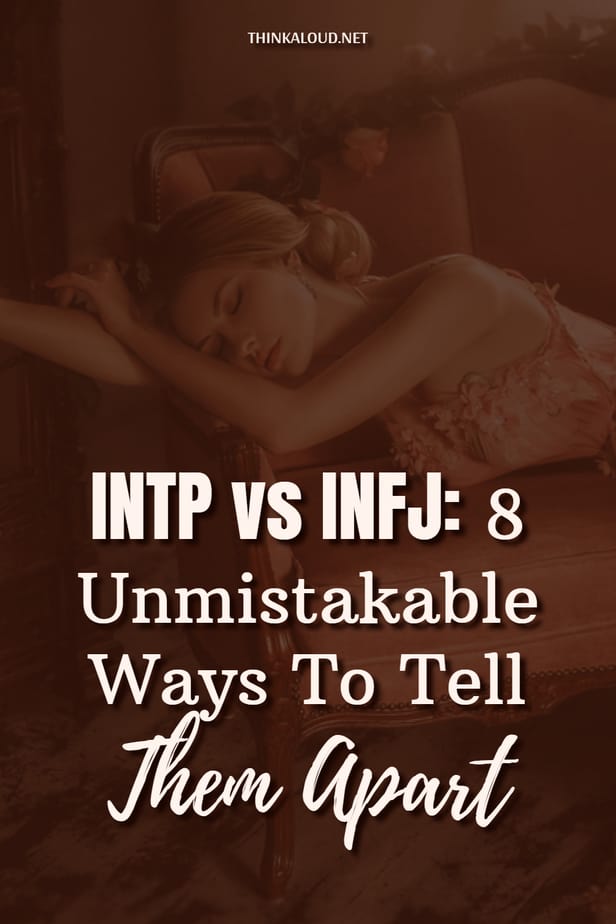Have you ever gone down the rabbit hole of trying to figure out your personality type? Chances are you stumbled upon the Myer-Briggs Type Indicator (MBTI) and thought to yourself, “Am I on the weird side of the internet again? I have to look up INTP vs INFJ because I have no idea what any of this means!”
Don’t worry, there’s hardly anything more relatable than lying in your bed late at night trying to figure out whether you’re the Counselor or the Architect. “Am I organized or messy? Am I emotional or indifferent?” Who knows!?
Or even better, spending your entire Sunday evening trying to figure out whether you’re compatible with your cute coworker. You have a feeling the two of you would work great together because you’re both creative and intellectual, but…
He seems to be more impulsive than you, which could become an issue in the long run. Let’s be honest, you have no idea whether the two of you would even end up in a serious relationship. It doesn’t hurt to know, right?
Well, your quick INTP vs INFJ google search has brought you to the right place! While these two personality types do share some similarities, there are a couple of unmistakable differences that can help you tell them apart once and for all.
INTP vs INFJ: Where’s the confusion?

Let’s start at the beginning, shall we? INTP and INFJ are two of the sixteen personality types created by Katherine Briggs and Isabel Myers. These personality types were identified to help people gain a better understanding of their own behavior.
You’ve probably been in situations where you’ve done something and ended up beating yourself over it for days. Let’s say you had an awkward encounter with your neighbor, you said something you didn’t want to say, or you ignored their question because you felt uncomfortable.
Why did you avoid answering their question? What made you feel so anxious? What made you react the way that you did? These personality types are meant to help you answer all those questions and more.
Once you figure out which personality type you belong to, you should be able to gain a better understanding of your own strengths and weaknesses. Not only that, but you should also be able to figure out other people’s mannerisms and motives.
Keep on reading to find out what exactly the deal is on the INTP vs INFJ front, what makes them so similar to each other, and how can you learn to tell them apart.
What does INTP stand for?
Before talking about this entire INTP vs INFJ thing, we first need to establish the meaning behind these acronyms. Believe it or not, they can help you understand different personality traits that are the most common among people of a certain personality type.
So, when referring to the INTP personality type, we are talking about someone who is introverted, intuitive, thinking, and perceiving. This personality type is also referred to as the Architect, the Objective Analyst, or even the Logician.
People who associate themselves with the INTP personality type adore their alone time. They’re typically introverted, which means that their social battery runs out pretty quickly. The only way for them to charge said battery is to spend some quality time on their own.
They’re also highly intuitive, which means they spend a lot of time following their gut feeling and seeing where it takes them. However, while their intuition is a strong driver, they still make their decisions based on reason rather than on gut feeling alone.
Lastly, INTPs love thinking outside of the box, being spontaneous and flexible, and living their life to the fullest. That might be quite surprising considering the fact that they’re typically introverted, but they don’t like wasting their time waiting for life to happen.
Does that sound anything like you? Or like that cute colleague of yours?
The most confusing part about the INTP and INFJ personality types is that they share some of the most important personality traits. Both of them are introverted and intuitive, but they still have their differences.
What does INFJ stand for?

Now that you know that these two personality types share certain similarities, you might be wondering about the latter half of the INFJ acronym. Well, INFJ stands for introversion, intuition, feeling, and judging, which explains why they do the things they do.
INFJs are also known as the Counselors, the Insightful Visionaries, or even the Advocates. They are typically labeled as idealistic, compassionate, and sensitive – the origin and the inspiration behind their nicknames.
Just like INTPs, INFJs prefer spending time on their own. That doesn’t mean they don’t go out and socialize, it simply means they appreciate being alone with their own thoughts and feelings. They might even come across as misanthropic, but that’s another pair of shoes entirely.
They’re highly intuitive, perceptive, and sensitive. They might be introverted, but that doesn’t stop them from listening to other people, helping them understand and solve their problems, and being there for them when everyone else decides to leave.
Unlike INTPs, INFJs make most of their decisions based on their feelings. They don’t disregard rhyme and reason, but they prefer relying on their intuition and gut feeling. You’d think they would also be spontaneous and flexible, but…
They’re actually incredibly planned and organized. Have you ever experienced a full-blown mental breakdown because things didn’t turn out the way you planned? Have you ever turned down a date because you felt as if you didn’t have enough time to organize everything? Well…
You might be an INFJ! If you’re still having trouble understanding this INTP vs INFJ thing, you might want to keep on reading. While these two personality types happen to share some similarities, there are still a couple of core differences that’ll help you tell them apart.
INTP vs INFJ: What are their core differences?
INTPs and INFJs are two completely different personality types! You might look at the first two letters and think to yourself “Well, they’re both introverted and intuitive. What else is there to know?” Trust me, there’s a lot more to uncover.
INTPs and INFJs have completely opposing motivations for doing the things they do. They solve their problems differently. They interact with other people differently. And they certainly have completely different intentions in the way they act. Let’s dive in, shall we?
1. INTPs are messy, INFJs are organized

Do you prefer keeping your workspace simple and uncluttered? Do you put everything back to where you found it? Or do you prefer being surrounded by what you like to call “organized chaos”? When comparing INTP vs INFJ, there are some important differences.
You see, INTPs love keeping their things where they can see them. They don’t like organizing them, picking them up and putting them back in their place (or even having a specific place reserved for specific things), or even cleaning up after themselves.
You might recognize INTPs when you confront them about their tardiness and they justify it by saying “it’s fully functional” or it’s an “organized mess.” There’s nothing wrong with being spontaneous, unhinged, and unbothered by the clutter, but INTPs do tend to let this mess dictate their life.
On the other hand, INFJs are the polar opposite of messy. Not only are they incredibly well organized, but they also aren’t able to put their focus on anything else if their space doesn’t match their personality. What does this mean?
Well, you might be able to recognize INFJs when you take notice of the way they sort everything in their life. They thrive in aesthetically pleasing spaces so they take the time out of their day to organize everything by color, shape, and/or size.
2. INTPs are spontaneous, INFJs are planned
Keeping in mind what we just learned about these two personality types, we should also add that they’re completely different when it comes to interacting with other people. While INTPs are more flexible and go with the flow, INFJs need to plan everything ahead of time.
So, INTPs are often viewed as more fun to be around. While they are incredibly introverted, this pivotal personality trait doesn’t stop them from throwing themselves into every opportunity that comes their way.
They truly love living their life to the fullest and they love doing everything in their power to achieve exactly that. They are more open to suggestions, they adapt to new situations and circumstances, and they accept change with an open heart.
On the other hand, INFJs don’t accept change at all! They despise stepping out of their comfort zone because they believe they already know everything there is to be known. It’s called a comfort zone for a reason, isn’t it!?
So, don’t be surprised if you hear them say something along the lines of “Wow, thanks for the invite.” Trust me, they weren’t planning on going anyway, but that doesn’t mean they didn’t want to be invited. They simply wanted to feel included (FOMO at its finest).
3. INTPs are impulsive, INFJs are cautious

When it comes to the INTP vs INFJ comparison, we shouldn’t forget about the opposing way in which they deal with future plans and activities. Do you schedule and plan out all your activities ahead of time? Or do you leave everything for the last minute and hope for the best?
You might have already guessed it, but INTPs are incredibly impulsive. They don’t stress about those little details or plan too much ahead of time. They simply throw themselves into whatever life has in store for them.
How crazy is that!? They figure things out as they go and don’t bother overthinking and overanalyzing anything that’s out of their control. While that’s a really mature way of thinking, INFJs don’t feel the same way.
INFJs can’t function unless they spend every second of every waking hour meticulously planning out and scheduling their activities. They enjoy establishing rules and routines, which make them more productive when it comes to their private and professional life.
Think of it this way. INFJs are the people who plan and prepare all their outfits based on the day of the week and scheduled activities. INTPs wake up late, roll out of bed, and spend fifteen minutes looking for their missing sock before heading out to work without it.
4. INTPs are pragmatic, INFJs are quixotic
What does that even mean!? Well, we’re no longer talking about workspace organization or the way these personality types interact with others. We’re talking about their values, beliefs, and ways in which they understand the world around them.
So, INTPs are pragmatic. This means that they make most of their decisions based on reason, confirmed facts, and logical explanations. They are extremely analytical and perceptive, and they only believe what they see with their own eyes.
They don’t have an issue with changing their values and beliefs the way they see fit. Other people might think that INTPs are confused and all over the place, but they’re not. While they might seem like they change their minds all the time, they have a really good understanding of how the world works.
On the other hand, INFJs are quixotic. They typically live by extremely strong values and beliefs that are impossible to explain to people like INTPs. Their beliefs aren’t always based on reason, but rather on their past experiences or the experiences of past generations.
But, that doesn’t stop them from trying to shove their beliefs down everyone’s throats! While that might sound quite harsh, it’s not far from the truth since the INFJs generally aren’t accommodating of the beliefs of others. Sounds like a major Karen alert, doesn’t it?
5. INTPs rely on thinking, INFJs rely on feeling

One of the main differences that come up when you type INTP vs INFJ into your search bar has to be the way these two personality types deal with important decisions in their everyday life. And we have the scoop!
So, INTPs are analytical and perceptive. When trying to decide ANYTHING, they spend hours and hours gathering information, weighing the advantages and disadvantages, and trying to think of every possible outcome of the situation.
Let’s be honest, there’s nothing surprising about that. INTPs are a lot like that one friend you have who makes a list of conversation topics before going on a date just to make sure she’s got all her bases covered. You can never be too prepared, right?
On the other hand, INFJs follow their heart and rely on their feelings to tell them when they’re making a mistake. They don’t disregard the logical solutions, but they do focus on how these logical solutions make them feel. And if the feeling ain’t right…
That’s not to say that either of these personality types makes a better point. While INTPs sometimes waste a lot of their time overthinking and overanalyzing, INFJs can overlook the obvious options. So, they simply have different solutions for the same problems.
6. INTPs are cold and reserved, INFJs are warm and emotional
Don’t get me wrong, INTPs aren’t intentionally cold and reserved. They’re merely thinkers, which means that they’re quite detached from their emotional side. They wouldn’t mind experiencing the same emotional turmoil INFJs go through every single day, but…
They don’t know how! Unfortunately, INTPs typically aren’t able to understand or express their own emotions. We all have that one friend who can’t bear the thought of saying “I love you” to anyone other than their mother, right!?
While we wouldn’t put the “emotionally unavailable” label on all INTPs, we would say that they tend to overlook the importance of emotions when interacting with others. So, they come across as cold and indifferent, even when they’re not.
On the other hand, the INFJs wear their hearts on their sleeves. They’re incredibly caring and compassionate, making them a favorite among other people. They often find themselves handling others’ emotional situations as they’re the ones turned to for help and guidance.
But that can easily turn into a double-edged sword. Who wants to spend their free time dealing with other people’s drama? Being cold and reserved might not get you a lot of friends, but it certainly gets you some peace and quiet.
7. INTPs crave intellectual connection, INFJs crave emotional connection

If you’ve made it this far in the INTP vs INFJ discussion, you’re probably recognizing some common and distinguishing behavioral patterns in these two personality types. So, you might not be surprised to read this subheading.
INTPs crave intellectual connection because they go through life ignoring their emotions. They’re not particularly bothered about making friends with people, impressing them with their amazing analytical skills, or wasting time on small talk.
They prefer having intellectual debates with people who share similar interests. If you’re wondering whether INTPs and INFJs would be a compatible match in such a debate, they wouldn’t. The INTP would disregard INFJ’s values and beliefs, and probably end up making them cry.
Trust me, INTPs love correcting other people’s mistakes, minor discrepancies in others’ arguments and statements, and feeling as if they’re smarter than anyone else in the room. Luckily for everyone in their close vicinity, this doesn’t happen often.
On the other hand, INFJs crave an emotional connection with pretty much anyone they cross their paths with. They are incredibly sensitive to other people’s opinions of them, which means that they spend most of their time trying to please everyone.
They also tend to come off as needy and clingy which makes people slightly uncomfortable. This might come as a surprise since both of these personality types are introverted, but INFJs prefer social interactions with people because of this very reason.
While they do need to spend some time alone to charge their social battery, INFJs genuinely enjoy meeting new people because they see it as a great chance to make a lasting emotional connection with someone they really like.
8. INTPs have acquaintances, INFJs have friends
Listen, there are people in this world who simply don’t care about what others think of them: “OMG, why is everyone so emotional?” “Was that supposed to be funny?” “Don’t hug me. No, please, stop.” And those people are probably INTPs.
Because they have a difficult time understanding other people and relating to them in any way other than intellectual, INTPs don’t really have friends. Don’t get me wrong, they have people they’re friendly with. They have people they hang out with. But…
Those people aren’t their friends, but simply acquaintances. INTPs have a difficult time connecting with people on a deeper level because they don’t feel comfortable sharing anything from their personal life with anyone.
It’s not that easy being friends with someone like that, but INTPs aren’t all dark and gloomy! Once they do manage to connect with someone on a deeper level, they will be incredibly loyal and supportive. They just need some time to come out of their shell.
On the other hand, INFJs don’t have any issues relating to other people, understanding their emotional needs, and making friends with them. Not only are they able to open up and share their own emotions, but they’re also able to help others with their own emotional baggage.
Conclusion
This whole INTP vs INFJ thing wasn’t so difficult to unpack, now was it? While there are a lot of different personality types, these two stand out because they’re so incredibly contrasting that it’s difficult to believe they would ever work well together.
First things first, if you’re trying to understand the difference between INTPs and INFJs, you need to look at the bigger picture. Take note of how these two personality types react to different situations, interact with other people, and make important decisions.
While they are both introverted and intuitive, they possess qualities that seem to make them the polar opposites of each other. So, if you’re wondering whether INTPs and INFJs would work well together, they could! After all, opposites do attract, don’t they?


Leave a comment